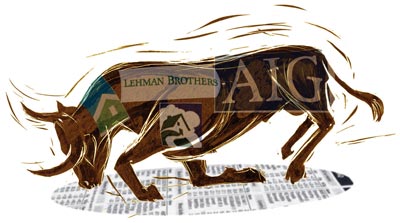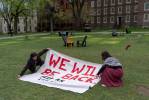Some Southern Nevadans panic as markets sink

Southern Nevadans are panicking and considering extraordinary steps to avoid losing more money in the stock market, real estate and even bank savings accounts, according to one local banker.
An 80-year-old man, for instance, said he wanted to withdraw all of his money, $750,000 in deposits, from Black Mountain Community Bank and put it in a safe-deposit box, rather than spreading the money around banks so he would qualify for full coverage under the Federal Deposit Insurance Corp.
Peter Atkinson, president of Black Mountain Rock Community Bank, however, told the customer that banks are prohibited from storing cash in their safe-deposit boxes.
Another business owner said he has spread $2 million in deposits among several banks so all of it is under the $100,000 federal deposit insurance maximum. Yet, the businessperson is considering moving it to Bank of America, figuring the bank is too big for the government to allow it to fail.
A retiree with fully insured bank deposits said he wants to withdraw $65,000 and keep the cash at his home for possible emergencies.
So far, all three customers have left their money at the bank, but Atkinson is pessimistic.
"They not only don’t like the stock market. They’re not sure they trust the government or the banks anymore," Atkinson said. "I’ve never seen this before, and I’ve been in banking 45 years."
Military historian Jim Hinds blames the housing bubble and mortgage lending practices for triggering the economic slump.
It was foreseeable that making loans to individuals with bad credit records would lead to loan delinquencies, he said.
"There was a certain recklessness that was involved," he said. "Maybe there was the assumption that the government will bail us out," as it has done in cases like investment bank Bear Stearns Cos. and insurance giant American International Group Inc., Hinds said.
Harvey Cohen, a retired senior executive, also singled out the housing and mortgage industry blow-ups as a catalyst for the country’s current economic and financial woes. He also blamed rampant mortgage loan fraud.
Two years ago, "every criminal trying to buy my house was looking for a mortgage-fraud deal," he said.
No one will buy homes now, he said, because they think prices are going lower. As a result, more people are losing their houses to foreclosure and the supply of houses is increasing, driving prices lower.
"You have to stop the supply of new homes coming on the market," he said. "The (federal government) has to step up and make mortgage loans available," he said. Mortgages should have fixed rates for 10 years or more so that homeowners can build equity.
"Nobody knows where this thing is going to end," Cohen said.
Ted Reed, 49, a government worker who oversees an Army Reserve armory, said the stock market makes him "a little nervous" and he is thinking about moving his retirement savings out of the stock market into safer investments.
It’s too late to cash out of the market, said Jag Mehta, adjunct professor of finance at the University of Nevada, Las Vegas and a chartered financial analyst. Investors who wanted to avoid the bloodbath should have sold stocks a year ago, Mehta said.
"At this point, if you’re selling out now, you’re guaranteeing a loss," said Reed Radosevich, president of Northern Trust Bank, which manages money for wealthy clients.
"We’re not going to make big moves to try to time the market," Radosevich said. "If you are constantly moving money back and forth, you may miss a huge up day."
Contact reporter John G. Edwards at jedwards@reviewjournal.com or 702-383-0420.


















